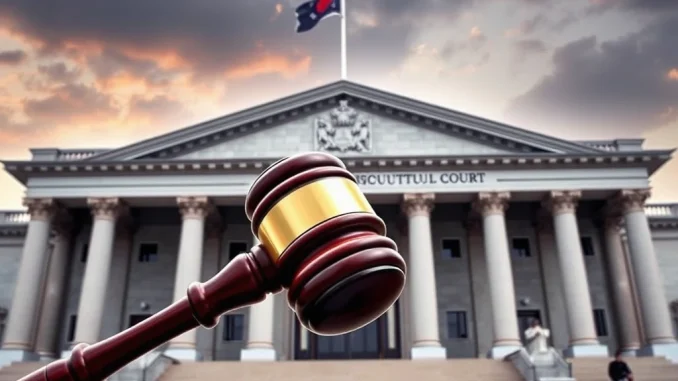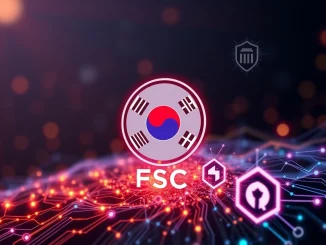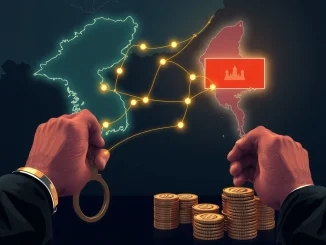
In a stunning turn of events that has sent shockwaves through the political landscape of South Korea, the Constitutional Court has delivered a **shocking** verdict: the **impeachment** of President Yoon Suk-yeol has been upheld. This landmark decision, announced just moments ago, marks a dramatic escalation in the ongoing **political crisis** and raises critical questions about the future direction of the nation. For those closely following global affairs and the delicate balance of power, this is a development you cannot afford to ignore.
Why Was President Yoon Impeached? Unpacking the Political Crisis in South Korea
The seeds of this **political crisis** were sown on December 14th when the National Assembly, South Korea’s legislative body, voted to impeach President Yoon. The grounds for this drastic measure? President Yoon’s declaration of martial law, which the National Assembly deemed unconstitutional and illegal. Let’s break down the key events leading to this unprecedented situation:
- The Martial Law Declaration: President Yoon’s decision to declare martial law was the immediate trigger for the impeachment motion. While the specifics surrounding this declaration are still unfolding, it appears to be the central point of contention.
- National Assembly’s Response: The National Assembly, acting swiftly, deemed this declaration a grave overreach of presidential power and a violation of the constitution. This led to the impeachment motion, highlighting a deep rift between the legislative and executive branches of government.
- Constitutional Court’s Role: The final arbiter in this matter was the Constitutional Court. Its role is to review the constitutionality of laws and government actions, including impeachment motions. The court’s decision to uphold the impeachment underscores the severity of the charges against **President Yoon**.
The Constitutional Court’s Decisive Ruling: A Turning Point for South Korea?
The **Constitutional Court**’s decision to uphold the **impeachment** is not just a legal judgment; it’s a profound political earthquake. Here’s what makes this ruling so significant:
| Aspect | Details |
|---|---|
| Immediate Removal from Office | Upon the court’s announcement, **President Yoon** was immediately removed from his position. This is not a symbolic gesture; it’s a complete and immediate transfer of power. |
| Validation of Impeachment Process | The court’s decision validates the National Assembly’s impeachment process, reinforcing the checks and balances within South Korea’s democratic system. |
| Potential for Political Instability | While upholding the rule of law, this event could also trigger a period of political instability as the nation navigates the sudden leadership vacuum. |
What Does This Mean for South Korea and the Region?
The **impeachment** of **President Yoon** is more than just a domestic affair for **South Korea**. It has far-reaching implications that could ripple across the region and beyond. Consider these potential impacts:
- Domestic Political Repercussions: South Korea now faces a period of uncertainty. The removal of a president mid-term can lead to political realignments, potential early elections, and shifts in policy direction.
- International Relations: South Korea’s foreign policy, particularly its relationships with key allies and neighbors, could be affected. The new leadership will need to reassure international partners and maintain stability in a complex geopolitical landscape.
- Economic Impact: Political instability can sometimes impact economic confidence. Markets will be closely watching how South Korea manages this transition and whether it affects business sentiment and investment.
President Yoon’s Impeachment: A Case Study in Democratic Accountability
The unfolding events in **South Korea** serve as a powerful case study in democratic accountability. The **impeachment** process, though disruptive, is a mechanism designed to hold leaders responsible for their actions. This situation highlights:
- Checks and Balances in Action: The South Korean system of checks and balances has been tested and, arguably, has functioned as intended. The National Assembly initiated the impeachment, and the **Constitutional Court** provided the final judgment.
- Rule of Law: The entire process has been conducted within the framework of the rule of law, demonstrating a commitment to constitutional principles even in times of crisis.
- Potential Lessons for Other Democracies: Other democratic nations can draw lessons from how South Korea is navigating this challenging period, particularly in terms of upholding democratic norms and institutions.
Looking Ahead: The Future of South Korean Politics After Impeachment
As **South Korea** stands at this critical juncture, the path forward remains uncertain. The **impeachment** of **President Yoon** opens a new chapter in the nation’s political history. Key questions now arise:
- Who will succeed President Yoon? The process for succession will be closely watched. Will there be an interim leader, or will early elections be called?
- What are the long-term political consequences? This event could reshape the political landscape, potentially leading to the rise of new political forces or a realignment of existing parties.
- How will South Korea maintain stability? The immediate priority will be to ensure a smooth transition of power and maintain political and social stability during this period of change.
In conclusion, the **Constitutional Court**’s decision to uphold the **impeachment** of **President Yoon** is a monumental event with significant implications for **South Korea** and the wider international community. It underscores the power of democratic institutions and the importance of accountability. As the dust settles, the world will be watching closely to see how South Korea navigates this new political reality and what lessons can be learned from this unprecedented moment.



